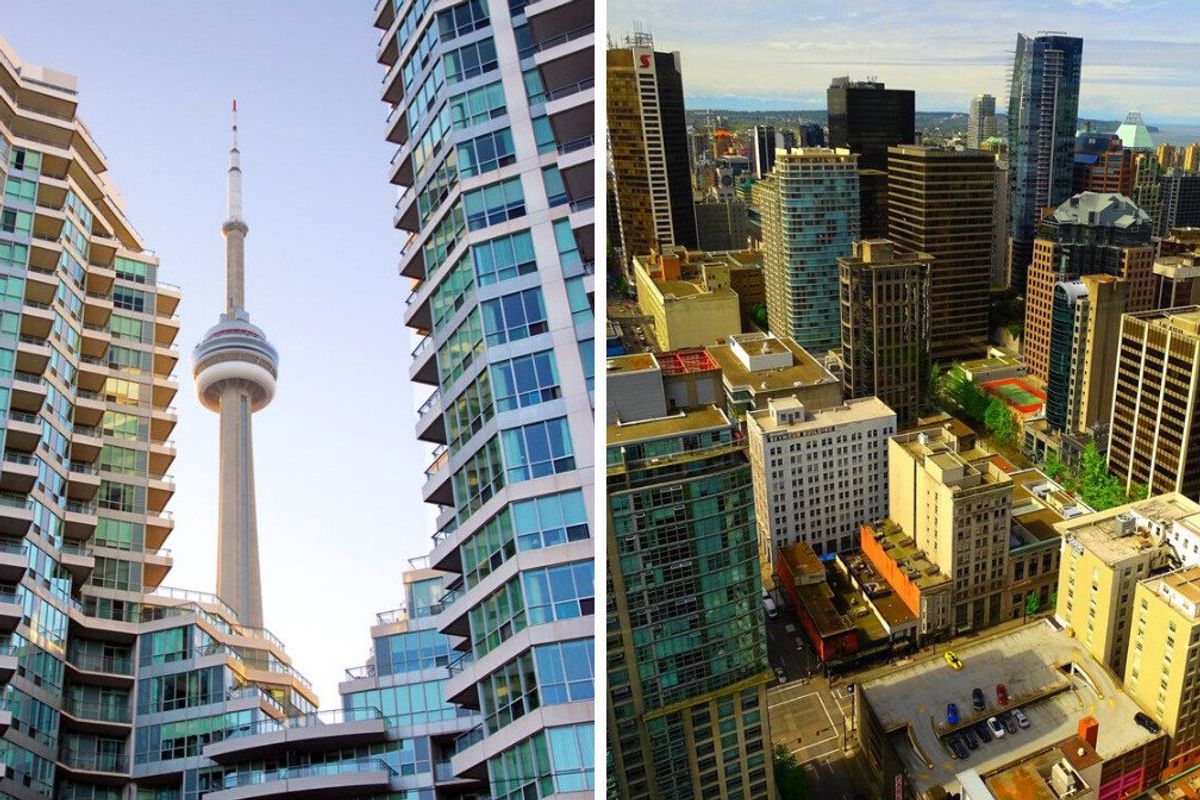
If you're looking for an apartment for rent in Toronto, Vancouver, Edmonton, Ottawa or pretty much anywhere else in Canada right now, you might be in for a pleasant surprise. Average rent in Canada is actually dropping, and it has been for a little while.
According to the latest national rent report from Rentals.ca and Urbanation, the average asking rent for all residential properties in Canada fell to $2,100 in January, marking a 4.4% decline from this time last year and hitting an 18-month low.
This drop is part of a larger trend, as January was the fourth consecutive month of rent declines in cities across Canada. Rentals.ca says asking rents have now decreased by an average of $96 per month over the past year.
It's a welcome reprieve to the cost of living for many renters in Canada — who've still seen a net growth in the average monthly rent of $104 from January 2023 and $296 since January 2022 — but it's not affecting the whole country equally.
Which cities have the highest and lowest rent in Canada?
Even with the overall dip in prices, some Canadian cities remain notoriously expensive. Vancouver continues to hold the top spot for priciest rent, with one-bedroom apartments averaging $2,542 and two-bedrooms coming in at $3,517.
Toronto isn't far behind, with one-bedroom units averaging $2,364 and two-bedrooms at $3,084. GTA hotspots Etobicoke, Mississauga and Burlington rounded out the top five most expensive rental markets in January.
On the flip side, renters in Regina, Saskatoon and Edmonton are enjoying some of the lowest average prices in the country.
Edmonton currently boasts the cheapest rent among major cities, with one-bedroom apartments averaging $1,363 and two-bedrooms at $1,687. Saskatoon and Regina are even more affordable, with one-bedroom rents averaging less than $1,250 in both cities.
Interestingly, rent is dropping in many of Canada's most expensive cities while creeping up in the more affordable ones. It's almost like an equalizing effect is taking place, making pricey cities slightly more accessible while pushing rents higher in places that were once considered budget-friendly.
Here's a breakdown of the average rent for one-bedroom apartments in some of Canada's biggest cities, along with how they've changed from this time last year:
- Vancouver, BC — $2,542 (-5%)
- Toronto, ON — $2,364 (-7%)
- Mississauga, ON — $2,282 (-3%)
- Victoria, BC — $2,085 (-1%)
- Ottawa, ON — $2,030 (-1%)
- Halifax, NS — $2,017 (+3%)
- Montreal, QC — $1,729 (-1%)
- Hamilton, ON — $1,728 (-5%)
- Calgary, AB — $1,691 (-6%)
- Windsor, ON — $1,551 (0%)
- Quebec City, QC — $1,437 (+7%)
- Winnipeg, MB — $1,409 (+6%)
- Edmonton, AB — $1,363 (+2%)
- Regina, SK — $1,239 (+1%)
- Saskatoon, SK — $1,217 (+2%)
Ontario sees the biggest rent drop
According to Rentals.ca, Ontario led the country in rent declines, with apartment rents falling 5.2% year-over-year to an average of $2,329 across the province in January.
Toronto saw its 12th consecutive month of rent decreases, with average rents dropping to a 30-month low of $2,615 — a drop of 7.6% from last year. The steepest annual declines in the country were in Richmond Hill (-12.2%) and Kingston (-9.5%).
Despite these decreases, some Ontario cities bucked the trend. Oakville saw the highest rent growth in the country, with a 12.2% annual increase, while Sarnia (+9.3%) and Niagara Falls (+8.0%) also saw notable rent hikes.
What's behind the rent decline?
The report points to a few key factors influencing this trend. First, the secondary rental market — condos and houses listed for rent — has seen significant price drops. The average asking rent for condominiums fell 6.5% over the past year, while rents for houses and townhomes dropped 8.9%.
Meanwhile, the purpose-built rental market (apartments built specifically for renting) experienced a much smaller decline of 1.7% overall, with rents for studio and three-bedroom units actually increasing.
Another major factor is that more rental listings are hitting the market, especially in shared accommodations. Listings for roommate rentals jumped 42% annually in January, reaching a record high and driving down the average rent for shared units to an 18-month low of $933.
Is now a good time to move?
If you've been thinking about moving, now might be a great time to snag a deal — especially if you're in Ontario, where rents are falling the fastest. But don't expect prices to keep dropping forever. Rentals.ca notes that while rent declines have been steady in recent months, overall rent prices remain much higher than they were a few years ago.
For renters looking to relocate, cities like Edmonton, Regina and Winnipeg continue to offer the most affordable options, while Toronto and Vancouver are still among the most expensive.
The good news? At least for now, Canada's rental market is offering a rare break for tenants across the country.
Love this? Check out our Narcity noticeboard for details on jobs, benefits, travel info and more!
AI tools may have been used to support the creation or distribution of this content; however, it has been carefully edited and fact-checked by a member of Narcity's Editorial team. For more information on our use of AI, please visit our Editorial Standards page.
Rent in Canada has reached a new low — Here's what it costs across the country right now
Source: News Article Viral


0 Comments